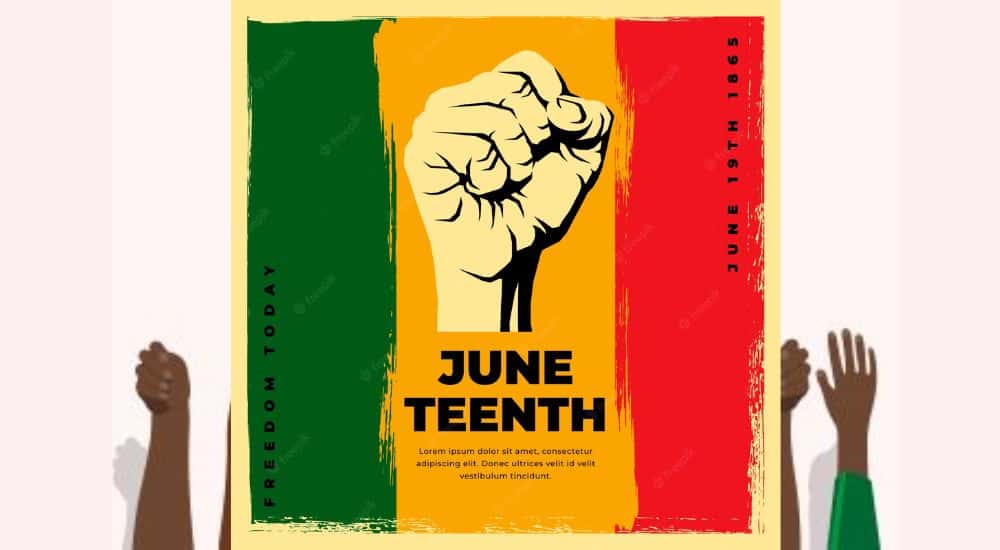Juneteenth holds significant historical importance in the United States as it commemorates the emancipation of enslaved African Americans. It is easier to understand the beginnings and growth of this celebration if you are aware of the historical backdrop surrounding it.
The institution of slavery persisted in the United States for centuries, with enslaved individuals enduring immense suffering and exploitation. However, on January 1, 1863, President Abraham Lincoln issued the Emancipation Proclamation, which declared that all slaves in Confederate territory were to be set free. This declaration established Juneteenth and represented a crucial period in American history.
The Emancipation Proclamation
A significant turning point in the struggle for freedom and equality was the Emancipation Proclamation. Slavery was officially outlawed in Confederate areas, but it took some time for its effects to spread over the entire nation.
Implementation of the proclamation was difficult, and it took two and a half years before the message of freedom reached the enslaved African Americans in Texas.
Juneteenth: The Celebration
Juneteenth, also known as Emancipation Day or Freedom Day, emerged as a celebration of the delayed but joyous news of freedom reaching the African-American community in Texas. It is observed annually on June 19th and has become a significant cultural and historical event.
Numerous events that honor African-American ancestry, resiliency, and development are held along with Juneteenth. It is a time for introspection, learning, and celebration. Juneteenth symbolizes both the continuous struggle for genuine equality and justice as well as the release of those who had been held captive.
Rituals and Traditions
Juneteenth is characterized by a range of rituals and traditions that have been passed down through generations. These practices help to preserve and honor the memory of the struggles faced by African Americans and the accomplishments achieved in the face of adversity.
Community gatherings play a central role in Juneteenth celebrations. Families, friends, and neighbors come together to participate in a variety of activities. These can include storytelling, musical performances, poetry readings, and dramatic presentations that showcase the rich cultural heritage of the African-American community.
Juneteenth Foods
Food holds great significance in Juneteenth celebrations, symbolizing unity, resilience, and cultural identity. Traditional dishes and recipes associated with African-American cuisine take center stage during these festivities. Some popular Juneteenth foods include:
1. Red Velvet Cake: This rich and velvety dessert, often adorned with cream cheese frosting, represents the bloodshed and resilience of African Americans throughout history.
2. Fried Chicken: A beloved soul food staple, fried chicken symbolizes the journey from bondage to liberation.
3. Collard Greens: Slow-cooked and seasoned with care, collard greens embody strength and resilience in the face of adversity.
4. Black-eyed Peas: These legumes are often served to bring good luck and prosperity for the future, reflecting hope and optimism.
Juneteenth Parades and Festivals
Parades and festivals form a vibrant part of Juneteenth celebrations across the United States. These events provide platforms for community members to come together, honor their heritage, and share in the collective joy of freedom.
Parades feature colorful floats, marching bands, and lively performances. They showcase the diversity and creativity within the African-American community while promoting unity and cultural pride. Festivals accompanying the parades often include music, dance, art exhibitions, and various forms of entertainment.
The Importance of Juneteenth
Juneteenth’s significance goes beyond its historical context and celebration. It holds profound importance in American history, culture, and the ongoing struggle for racial equality. Understanding and acknowledging the importance of Juneteenth is crucial in fostering a more inclusive society.
Juneteenth’s Impact on American History
Juneteenth serves as a powerful reminder of the deep-rooted history of slavery in the United States. It highlights the struggles endured by enslaved African Americans and their journey toward freedom. By recognizing and commemorating Juneteenth, we honor the resilience and perseverance of those who fought for their liberation.
Furthermore, Juneteenth amplifies the stories and experiences of African Americans, shedding light on their contributions to the nation’s growth and progress. It serves as a critical piece of the complex tapestry that is American history.
Recognition and Observance
In recent years, there has been a growing movement to recognize Juneteenth as a nationally observed holiday. Many states have already declared it a state holiday or a day of observance. This recognition signifies the importance of Juneteenth as a pivotal moment in American history and acknowledges the need to confront the painful legacy of slavery.
By officially recognizing Juneteenth, we can ensure that its significance is widely acknowledged and celebrated across the country. It provides an opportunity for individuals and communities to engage in meaningful conversations, education, and reflection about the ongoing fight for equality and justice.
The Fight for Juneteenth as a National Holiday
Efforts to establish Juneteenth as a nationally recognized holiday are gaining momentum. Advocates argue that designating Juneteenth as a federal holiday would signal a commitment to confronting and addressing the nation’s history of slavery and racial injustice.
A national holiday for Juneteenth would promote unity and encourage all Americans to learn about and engage with this important chapter in history. It would serve as a unifying symbol of progress, reminding us of the work that still needs to be done to achieve true equality.
Juneteenth in Popular Culture
Juneteenth has also made its way into popular culture, with its significance being represented in various artistic expressions. From literature and music to film and television, Juneteenth has become a source of inspiration for artists, further amplifying its importance and raising awareness among wider audiences.
Through these creative mediums, Juneteenth’s message of freedom, resilience, and the ongoing struggle for equality reaches people of diverse backgrounds, fostering empathy and understanding.
The Role of Education and Awareness
Education and awareness play a crucial role in promoting the significance of Juneteenth. By integrating the history of Juneteenth into educational curricula, we can ensure that future generations are knowledgeable about the struggles and achievements of African Americans. This helps foster empathy, understanding, and a commitment to building a more equitable society.
Moreover, public events, exhibitions, and community initiatives centered around Juneteenth provide opportunities for dialogue and learning. They create spaces for people to engage with the historical context, stories, and experiences associated with Juneteenth.
Juneteenth: A Time for Reflection
Juneteenth offers a moment of reflection for individuals and communities. It prompts us to examine the progress made in the pursuit of equality and justice and to acknowledge the work that remains. It serves as a reminder that freedom and equality are ongoing struggles that require continuous effort and vigilance.

Juneteenth encourages dialogue and engagement. It provides an opportunity to have open and honest conversations about racial injustice, systemic oppression, and the steps needed to build a more inclusive society. It invites individuals to reflect on their own roles in promoting equality and to take action toward positive change.
10 Powerful Juneteenth Quotes That Celebrate Freedom
- “Emancipation is the moment we all breathe a little deeper, smile a little wider, and hope a little stronger.”
- “Juneteenth reminds us that freedom is not given, but earned and fought for.” – Unknown
- “Freedom is never voluntarily given by the oppressor; it must be demanded by the oppressed.”
- “Juneteenth is a celebration of the human spirit and the resilience of a people who never gave up on their dreams of freedom.”
- “Our freedom is bound together, and when one of us is oppressed, none of us are truly free.”
- “Juneteenth is a reminder that liberty and justice for all are not just words but a goal worth fighting for.”
- “The chains of slavery may be broken, but the scars remain. Juneteenth is a day to heal and remember.”
- “Juneteenth is not just about commemorating the past; it is about building a better future for all.”
- “Freedom is not a gift bestowed upon us by other men, but a right that belongs to us by the laws of God and nature.”
- “Juneteenth represents the triumph of the human spirit over the forces of oppression.”
Conclusion
Juneteenth stands as a powerful symbol of freedom, resilience, and progress. It commemorates the end of slavery in the United States and serves as a reminder of the ongoing fight for equality and justice. By celebrating Juneteenth, we honor the struggles and triumphs of African Americans throughout history and commit ourselves to creating a more inclusive and equitable future.
You Can Check 40+ Juneteenth Shirt For A Historic Celebration.
100 Juneteenth Shirt Ideas to Celebrate Freedom and Equality
50+ Juneteenth Outfits To Express Freedom And Unity
FAQs About Juneteenth
Q. What is the origin of Juneteenth?
Ans: Juneteenth originated in Galveston, Texas, on June 19, 1865, when Union soldiers announced the end of slavery in the state.
Q. Is Juneteenth a national holiday?
Ans: While Juneteenth is not yet recognized as a national holiday, several states have officially recognized it as a state holiday or observance. Efforts are underway to establish it as a federal holiday.
Q. How can I observe Juneteenth?
Ans: You can observe Juneteenth by learning about its history, attending local events and celebrations, engaging in discussions about racial equality, supporting African-American businesses, and taking action to promote social justice.

